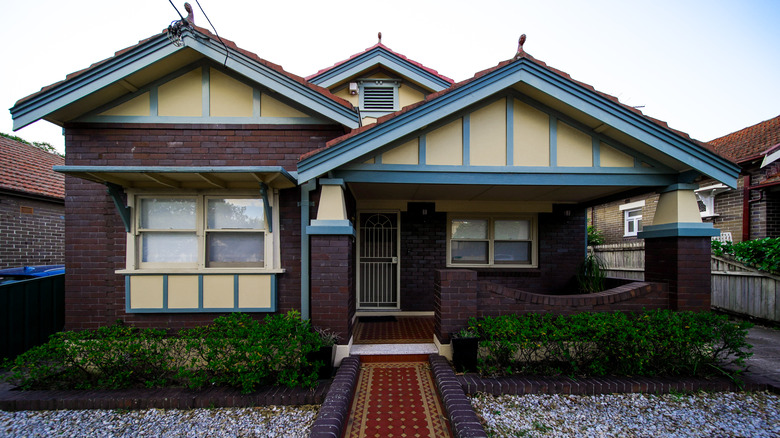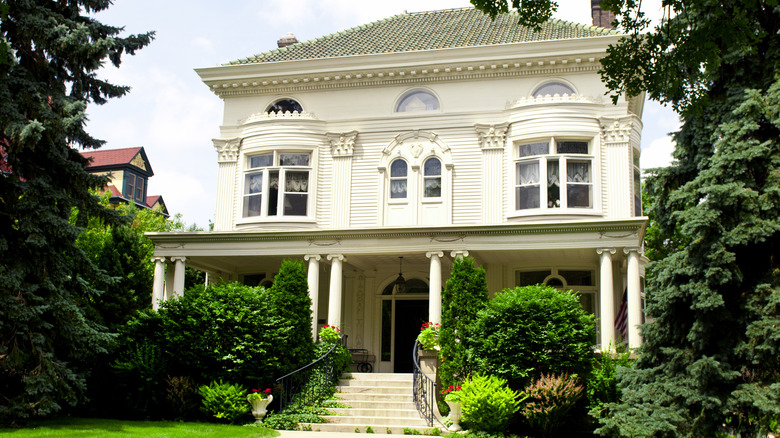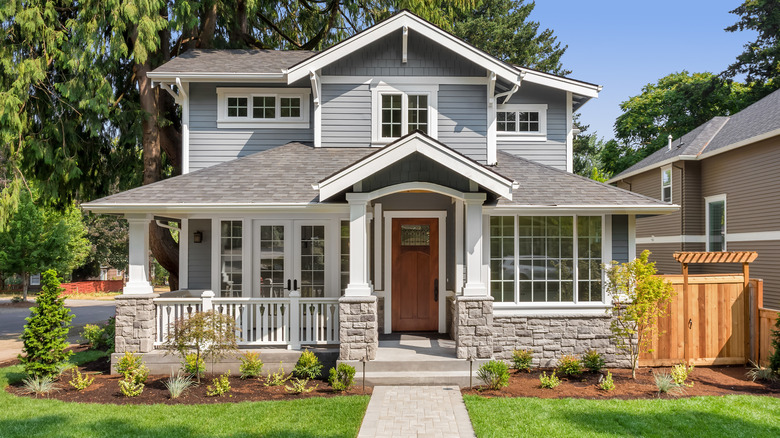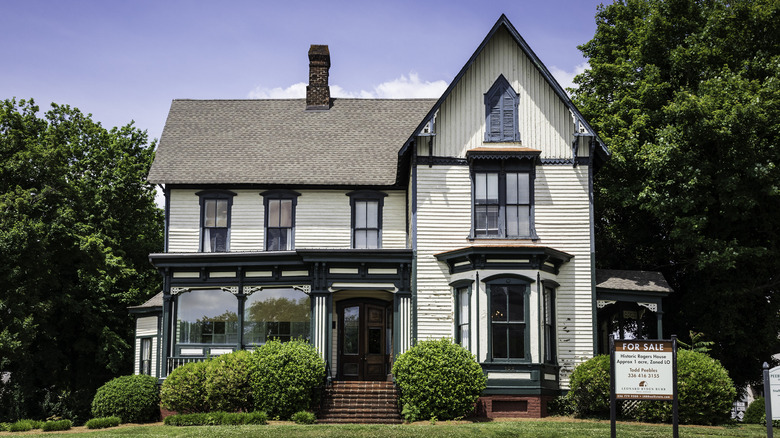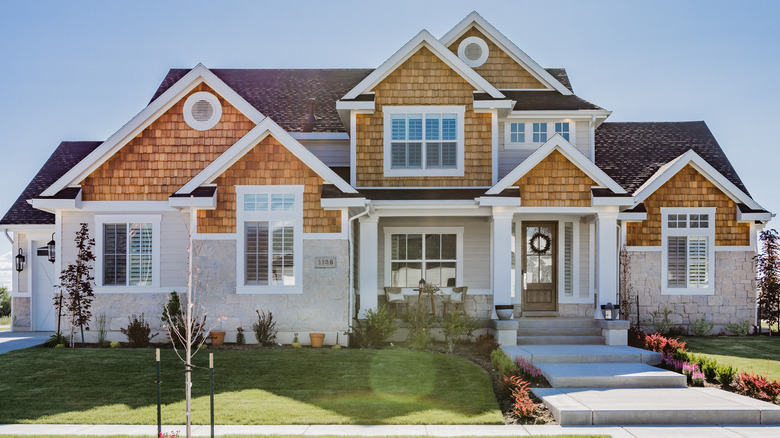An Expert Weighs In On The New Construction Vs. Old Home Debate - Exclusive
A new home or an old one; that is the question. This classic debate has been plaguing homeowners and homebuyers for decades. Do you want to opt for that cute bungalow on the corner with tons of character, or does a swanky pad in the new subdivision call you with its clean lines and fresh landscaping?
According to Budget Dumpster, there isn't a solid rule for when a residence becomes old, per se. However, the unwritten rule is that if a house is 50 years or older, it's considered seasoned, and anything built before 1920 is an antique. Meanwhile, new construction would be considered as a residence built within the last couple of years.
But which one is the best choice for homeowners? In an exclusive interview with House Digest, Josh Steppling, a broker associate at Josh Steppling Group at EXP Realty, gives his opinion on this age-old debate. From an expert perspective, both have advantages and downsides to consider, especially if you're looking to buy a new property.
The pros of old homes
There are many people who prefer older houses to new construction. Why? "Old homes do have many benefits," Josh Steppling says. "To start, they're typically much less per square foot than the newer alternatives. Additionally, it's more common to have a larger lot size since they were probably built during a time when land was not as scarce. This is especially true in growing suburbs where many new construction properties can be zero-lot-line communities."
A zero-lot-line is residential real estate where the house comes close to the edge of the property line, which often means smaller front yards and neighboring structures in close proximity. So with an older residence, you're more likely to get a larger place on a larger lot for much less money compared with new construction of comparable size.
But the extra space isn't the only benefit, as noted by Steppling. "Older homes truly can have a better quality of construction than new, bulk-production homes," he continued. "Many old homes were built with more durable materials, especially when considering wood construction, and the sizes of rooms and closets are usually larger."
The pros of new construction
New construction might cost more upfront, but Josh Steppling notes that it can save you money in the long term. "When it comes to new construction homes, the main comparative advantage is that you shouldn't have to make any big capital expenditures any time soon," he tells House Digest. "Roofs, electrical, plumbing, and heating and cooling systems will statistically outlast the time you're expecting to live in the home." With this option, you also likely won't have to have a major renovation on the structure. But if you do decide to do a remodel, like adding an addition or upgrading your bathroom, you won't have to deal with bringing things up to code.
There are more ways that a new construction home can save you money, too. "Insurance and energy costs will be lower since everything is up to current building codes, typically with energy-efficiency in mind," Steppling adds. And with new windows and insulation, your place will stay cool in the summer and warm in the winter, keeping energy bills lower.
The cons of old homes
Despite the charm and space an older house can provide, owners of such properties have to be diligent; it's no secret that they might need a bit of repair. "For older homes, you'll want to pay much more attention to your home inspection, and depending on the age, you will want to keep an eye out for potential defects, recalls, or health hazards," Josh Steppling cautions.
Depending on the specific age of a place, too, there may be the potential for serious health threats. "Homes built before 1978 have a 25% to 80% higher chance of having lead-based paint –- the older it is, the higher the risk," Steppling continues. "If the house was built between 1920 and 1960, there's a good chance it had cloth wiring that needs [to be] replaced." These might be necessary upgrades to make the house livable, or tackled when doing a renovation to bring it up to code. Just be mindful that remediation and replacement of outdated materials can quickly get expensive.
The cons of new construction
Many people love new construction because everything is modern, and it has the potential to be customized with your preferred finishes. But Josh Steppling says there are potential issues to keep in mind here. "New construction individuality comes at a cost," he explains. "The cheapest new homes will be spec homes that have mass-appeal designs chosen by the builders." And that means that these houses can look pretty cookie-cutter.
Of course, there are avenues for creating more unique residences from the start. However, it's not going to be cheap, per Steppling. "The more expensive options will be custom builders who will allow the home to be your canvas at a steep price tag," he continues. You can work with professional architects, carpenters, and interior designers to create your dream home, choosing everything from the layout to the exterior to the cosmetic finishes. But, as Steppling says, be prepared to pay a pretty penny to be able to customize every detail.
It comes down to the buyer's choice
So, with the debate of new construction vs. old home, which one wins out? Well, it's not that cut and dry. Most experts agree that it's the buyer's choice, including Josh Steppling. "The truth is that most homebuyers' perceptions when comparing new construction homes to older homes is superficial," he shares. "Older homes can have more character while brand new homes can come off as mass-produced with less originality, but there are more fine-tuned details that should be kept in mind." Indeed, both have their own pros and cons, whether they are aesthetic or the financials associated with owning and personalizing the house.
In the end, buying a property is a highly personal endeavor. While looking for your next abode, you're trying to balance wants, needs, functionality, location, costs, and a myriad of other factors. So when it comes to buying old or new, Steppling tells House Digest, "All-in-all, there really isn't a right way to look at this, but there is more to consider than just cosmetic appeal."
